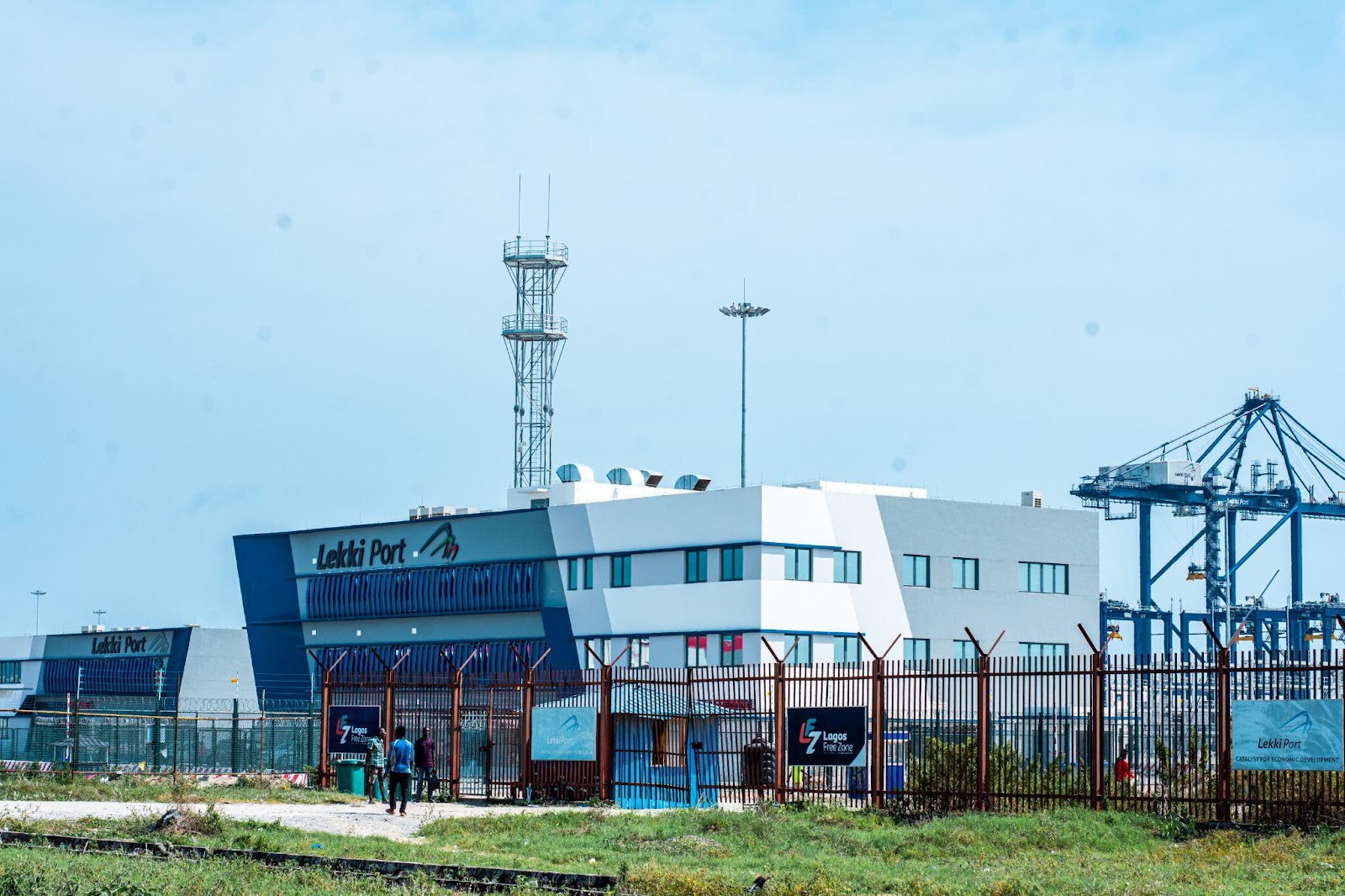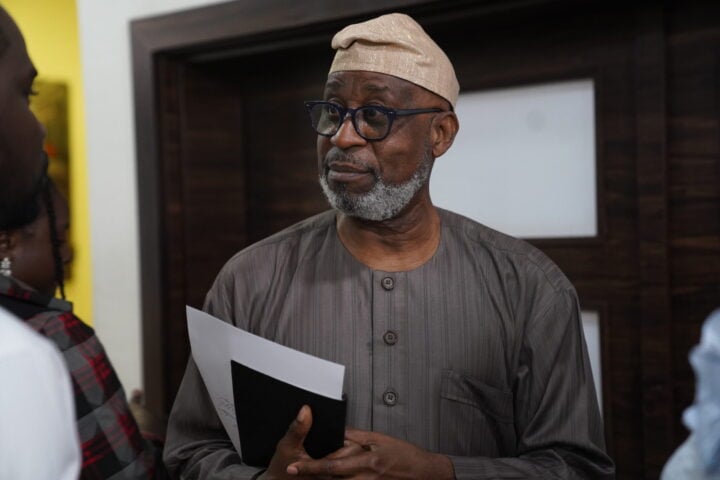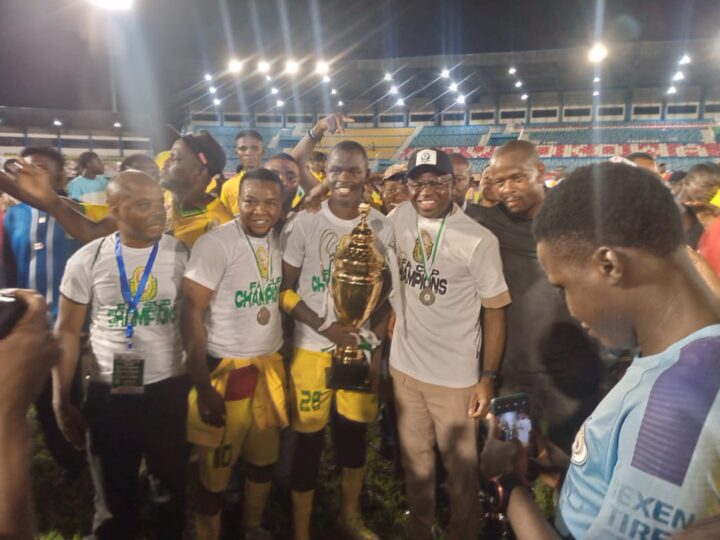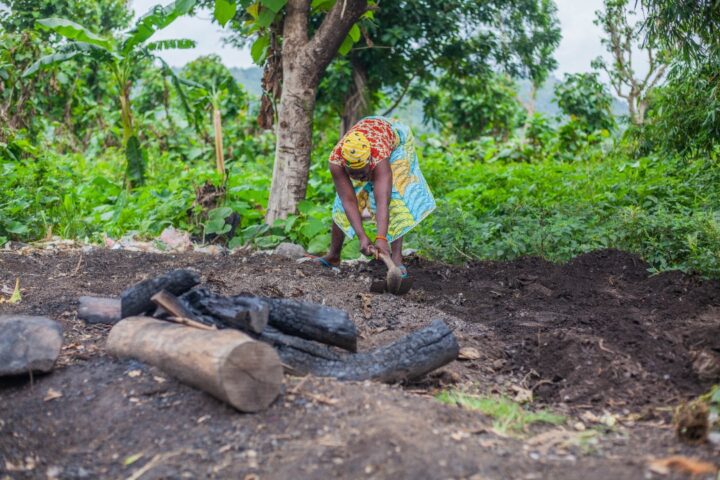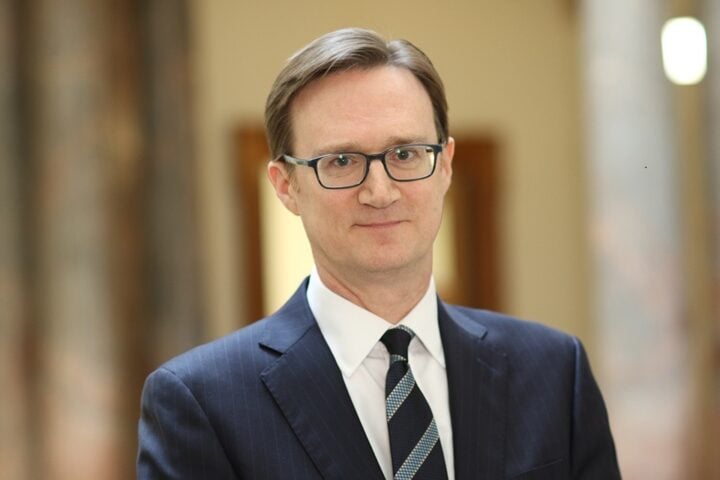A front view of the Lekki Seaport
This story was produced with support from the Rainforest Journalism Fund in partnership with the Pulitzer Center.
BY IBRAHIM ADEYEMI
Nobody wanted to tell the story behind the pain of many residents of the coastal settlements of Lekki in Lagos. A few people said it had better be buried in a secret grave forever. When this reporter probed further, he found a narrative told with grief.
Lekki was a blossoming town of aquatic splendour blessed with green vegetation and rich biodiversity. But the government would endorse a multi-billion naira seaport to grow the national treasury, create thousands of jobs and enable the development of a semi-urban community. It now appears that that is at the expense of the environment and local fishing communities.
Advertisement
THE $1 BILLION ECONOMIC-FRIENDLY SEAPORT

On 23 January, President Muhammadu Buhari inaugurated the Lekki seaport, described as the deepest in sub-Saharan Africa. On a build, own, operate, and transfer (BOOT) basis, the seaport project, a 45-year concession, was awarded to the Lekki Port LFTZ Enterprise Limited (LPLEL) by the Nigerian Ports Authority (NPA). Occupying 90 hectares of the 830 hectares of land reserved for the Lagos Free Zone (LFZ), the port was constructed by the China Harbour Engineering Company Limited (CHEC).
On several occasions, the Lagos government had said it would generate $201 billion from the Lekki deep seaport when completed. It described the project as “a game-changer and a pacesetter”. The Infrastructure Concession Regulatory Commission (ICRC) added that the new port would contribute $361 billion in economic impact in 45 years. The ICRC projected that $201 billion would be generated from revenue, royalties, duties and taxes while $158 billion would be gained from direct and indirect business impacts.

Before the construction of the Lekki seaport, an Environmental and Social Impact Assessment (ESIA) was conducted on the 90 hectares of land the project would occupy and its host communities. The project site was surveyed for assessment of the human, biological and physical environment following the federal government’s Environmental Impact Assessment Act of 1992.
Advertisement
In the assessment document, environmental experts predicted there would be adverse impacts on traditional livelihoods, noting that fishermen would likely be restricted from operating in the channel area during dredging and marine infrastructure construction. They observed that the project would hurt the terrestrial ecosystem of the port site vegetation, soil and the removal of wildlife habitat.
They foresaw, again, that dredging of the harbour and access channel, construction of marine infrastructure, and disposal of dredged material would injure the space’s biodiversity. They expressed fear of an adverse impact on the marine ecosystem resulting from the maritime shipping activity, noting that the landscape’s biodiversity would be in danger, primarily due to the induced urbanisation of the community. They recommended that a management system be put in place to mitigate the negative impacts of the project.
“The environmental and social management system will include the preparation of detailed standard operating procedures for all port activities as well as comprehensive emergency preparedness and response plans to deal with accidents that could threaten the health and safety of workers, nearby residents, and the environment,” the document stated, showing commitments to mitigating environmental hazards on the Lekki shore.
DANGERS ACROSS AND THE TEARS OF A PEOPLE
In October 2022, this reporter witnessed a wave of magic bricks turning into modern houses and industries in Lekki town. In Magbon Segun village, for instance, the sea rolled up into a mountain, roared and simmered downward while a horde of helmeted Chinese workers engineered the Lekki Deep Port a distance away.
Advertisement

However, such modern development comes with a price, including environmental impact and people’s livelihoods.
Life used to be good on the Lekki shore, residents said. Fathers fed their families with proceeds from fishing. Children looked up to their successful fishermen-fathers. Fishes in the Lekki streams beckoned on the people, and fish vendors smiled at one another at different points of sale.
But this rural life was disrupted for the people when the deep seaport emerged, causing many people deep pain. Now, the port has stripped the Lekki community of its charm and the people of their wealth. Catfish, tilapia and crabs were easy to catch; Chinese fish and sharks were the pride of a successful fisherman. But these aquatic blessings are disappearing, ruining the livelihood of the people, many of whom want to continue fishing.

Fishermen sat in groups tending to their nets and wearing long looks on the shore of Magbon Segun. Their business was crumbling, they said, and the cost of livelihood was almost costing them their lives.
Advertisement
One said he had fished for three decades, bought cars, built houses and sent children to schools but has now become a peasant fisherman. Another one said he used to earn up to N200,000 from every fishing adventure but rarely makes up to N30,000 now. A fish vendor said she had toiled for days to trade fish, but her efforts yielded nothing.

One common thing the fishermen said: The dredging activities by the seaport engineers are destroying their fishery resources and chasing the fish away. The more they dredge, the farther the fishes run.
Advertisement
The locals’ claim seems sensational, but the United Nations Economic and Social Commission for the Pacific (UNESCAP) confirmed it in a report, saying dredging removes marine habitat, leading to a gross loss of fishery resources. The report also said disturbance from construction activities on a port site terrorises fishes, displacing them while dredging removes plants and animals living in the sea.
As of July 2022, the construction works on the Lekki seaport were nearing conclusion with dredging activities pegged at 97. 90 per cent. By January 2023, the port was set to commence its operation.
Advertisement
“We are pleased to announce that the construction of Lekki Port is now at 94.3% completion,” Lekki Deep Sea Port stated on its website at the time.
LEKKI: TRAVELLING THROUGH THE HISTORY LANE

The place many call Lekki is an extension of the small rural settlement between the lagoon and the Atlantic Ocean of Nigeria’s Lagos State. In the dark days of the 19th century, Lekki was a meeting point for invading imperialists trading Africans overseas for cash.
Advertisement
A certain Lecqui, a Portuguese slave master, was notorious for perpetuating this small town to merchandise Nigerians for slave labour abroad. He had built a slave trade empire and the small town would later be named after him. Lecqui would die of severe malaria in his Lekki home, after many years of active slave-trading of Nigerians, according to historical records.
But in 1963, Obafemi Awolowo, the first premier of the defunct Western Region, was charged with treasonable felony and his prison home would be Lecqui’s former apartment in Lekki. His restriction to the town offered him the opportunity to explore the area closely.

He then acknowledged the great uniqueness of Lekki town, due to its numerous natural resources and biodiversity, prophesying that the area would be a hub for a great economic and industrial revolution. And in truth, decades after Awolowo’s prophecy, the Deep Seaport, the Dangote Refinery, and other economic-growing industries, sprouted out of the Lekki soil.
But these developments would not be cost-free.
THE COST OF A MULTI-BILLION NAIRA SEAPORT

The survival of many residents of Lekki was threatened when the government engineered the seaport. As industrial activities germinated on their land, the locals in Lekki failed to grow with these developments. This costs them their livelihood because their sole and traditional source of income is fishing. But the era of enjoying the gifts of nature abundantly is vanishing due to the emergence of the port and other industries.
Residents said their fishes consume the toxins daily excreted from the seaport. The fish are weakened once they taste the dangerous wastes and eventually die or run far away.
Sunday Abouhje, a fisherman on the seashore, is a witness to the tears of the Lekki people. I met Abouhje in Idotun, a small village on the shore of Lekki. The heavy-hearted man trudged through the sandy road of the riverine community, carrying the burden of insistent self-doubt over yet another failed fishing adventure.
“May the good, flourishing moments return to Idotun,” he said, revealing how his life had changed in many ways he never envisaged.
When I asked what exactly has changed, he said: “These days, we suffer before we catch fish. Before now, we would use the engines for seven or eight years before they get spoiled, but now they get spoiled quickly. The cause is the chemicals they pour into the water (from the seaport).”

Environmental and port experts consulted for this story said the same thing: Toxic discharges from ships could be sources of water pollution. Bilgewater, ballast water, oily wastes, sewage, and garbage, among others, are residues in a ship that could toxify water. They also said spills of oils, lubricants, fuels and other oily liquids may be other sources of water pollution.
Once an oil or oily compound is discharged into water, it is spread on the surface by winds and currents, forming a thin layer, a report by the Economic and Social Commission for Asia and Pacific, stated. On the surface of seas in tropical or temperate zones, oils can be polymerized gradually by biodegradation and eventually form dense particles which sink.
The Lekki Seaport is established on the Lagos Free Trade Zone, a multi-billion naira investment destination with world-class infrastructures. Some activities at the Free Trade Zone industrial complex — integrated with the Lekki Seaport — are harming the host communities, the recipients of its industrial wastes. Using geospatial assessment, the experts said the Free Trade Zone industries have two main drainage channels where they dispose of industrial wastewater.

 Satellite images of industrial wastewater draining into the coastal basin/Images: Google Earth
Satellite images of industrial wastewater draining into the coastal basin/Images: Google Earth
The waste from sailing vessels, the fragments from dredging and the oily pass-outs from machines deployed to construct the seaport endanger the people’s lives and destroy their marine biodiversity. However, other industries in the Free Trade Zone aggravate the conditions of the people as they have nowhere else to deposit their wastes than directly into the waters where the fishes live and the fishermen seek survival.
Experts said this has implications for the fishing economy, considering that the drainages lead directly to the fishing coast of these communities, depositing oil and cosmetic chemical waste in the basin.
 The satellite map shows the northernmost drain and the Dangote fertilizer plant drain.
The satellite map shows the northernmost drain and the Dangote fertilizer plant drain.
 This animated map shows the places the FTZ companies are likely impacting with their operations.
This animated map shows the places the FTZ companies are likely impacting with their operations.
What exactly is consuming the swamp lakes in Idotun, a small community in Lekki? Neither the villagers nor their chiefs could provide an answer. Their narrative was that the lake swamp is a natural gift and the God of nature has taken it from them.
THEY WERE WRONG
Before the construction of the Lekki Seaport, there were two swamp lakes in Idotun, situated about two kilometres apart. These lakes flanked the community and withstood change for decades.
Today, only one of the lakes is there.
On the far shores of Idotun and Magbon Segun, however, hundreds of palm and coconut trees have died since the emergence of the port, residents said. Before now, villagers said, coconut was a common commodity in the area. Many people depended solely on trading coconuts and palm kernels but that business is fast dying. The palms and cocoanut-dominated lands had been taken over and turned into the jetty areas of the port, residents said.
 Gif: Idotun Swamp Lakes /Google Earth
Gif: Idotun Swamp Lakes /Google Earth
The emergence of the deep seaport had depleted the swamp pond on the western side of this community. The Chinese engineers working on the seaport had sand-filled the lake to carve a dock area for the seaport. And now, satellite images obtained show that the deep port’s shipping park has consumed the swamp lake.
 Construction of the seaport! Satellite: Google Earth Pro.
Construction of the seaport! Satellite: Google Earth Pro.
TWO PORTS, ONE TRAGEDY: EATERS OF LEKKI’S BIODIVERSITY
Some 10 kilometres from the Lekki deep port is a smaller port belonging to Aliko Dangote, Africa’s richest man. It’s a cargo port for the Dangote Refinery. Satellite data shows the jetty area of the smaller Dangote port was indeed built at the expense of a 29,000 sqm pond. No less, the Dangote seaport is an accomplice to the Lekki deep port in the tragedy befalling the swamp water ecosystem of the town.
The Lagos State Environmental Protection Agency (LASEPA) representative failed to respond to a public service query sent to its official mail to know what measures had been taken by the authorities to mitigate the adverse effects of the seaport on host communities. The state established LASEPA to ensure sound environmental management programmes and projects in Lagos.
In November 2021, the Lekki port and state officials engaged the host communities but the results appear to be controversial. PREMIUM TIMES reached out to the Lekki Seaport management on how it was mitigating the adverse effects on the environment. In a statement sent through one of its representatives, Bola Ajibola, the seaport management said it adhered strictly to the Environmental Impact Assessment conducted before the construction of the port, following the international environmental standards and support from the Federal Ministry of Environment.
The seaport authorities also said that “the potential impacts identified in the EIA report were managed by continuously monitoring the environmental matrices to mitigate and/or take corrective action if any indices go beyond threshold limits”.
“The construction of the Port was carried out in line with environmental and social management best practices,” the management said. “We are aware that due to the exigencies of the construction and eventual operations of the Lekki Port, fishing by some of the occupants to the host communities was affected, we engaged the affected persons and fully compensated them.”

A reporter went back to the host communities to probe further after the response of the seaport management. Several fishermen showed resentment over the “full compensation” claim, saying what they got could not be described as ‘full compensation.”
Ayinla Ismaila, the chairman of the association of fishermen in the Lekki community, said there was no way the seaport would “fully compensate” the Lekki community as claimed and he would not be aware of it.
“There were no formal compensations, per se,” he said in the Yoruba language. “At a time, we were stopped from fishing and we protested, asking them what they wanted us to feed on if we don’t fish. They then gave us some money for food. Is the money — about just N2.5 million — enough as compensation for the damage caused in our lives?”
‘COMPENSATION NOT ENOUGH TO BUY CIGARETTES’
Fishermen and local chiefs in Idotun and Magbon Segun villages said Ismaila was right. They described what the seaport management offered the shore people as “gba mabinu” — a Yoruba word for a small consolation stipend to pacify the fishermen. “Can we call the sum of N50,000 compensation?” asked Liasu Ogundipe, a fisherman and local chief in Idotun who said that was the amount he got.
Ogundipe said he had catered to himself, 10 children and two wives for 29 years as a fisherman before the seaport emerged. Now, to even feed is hard, he said.
“The so-called compensation was not even enough to buy cigarettes,” he said, wearing a long face dominated with fury.
Other fishermen in Idotun made similar statements as Ogundipe on the compensation claim by the port management. One such person, Adams Kabiru, said while some people got some consolation stipends from the port management, he got nothing.

Kabiru said he learned some people, like Ogundipe, were given some money to lure them into silence over environmental damage caused in the community. “But as for me, I received nothing from the seaport,” he said, sharing his ordeal as a fisherman on the Idotun seashore in the last decade.
In Mabgon Segun and its nearby villages, the story is similar. While some people admitted to being partially compensated, some fishermen and stakeholders in the community insisted nothing was paid or done to them as compensation. Idowu Agbaraojo, 55, said he had been fishing in the community since 1990 but his only means of livelihood has been ruined by the existence of the port. Yet there was no compensation, he said. At least five other fishermen interviewed in the community said the same thing.
In April 2023, they said, the port management gathered the fishermen on the Magbon Segun shore for a meeting. They had thought compensations would be discussed but they were wrong. At the meeting, the port representatives told them they would begin operations soon and asked for their cooperation to avoid facing the wrath of the authority. “They only gave us the sum of N5,000 as transport fare,” Agbaraojo said. His claim was corroborated by some other villagers on the shore.
However, the fishermen suggested that the Lekki port authorities might have sealed a deal with their village chief. When the reporter met the village chief, Mufutau Dauda, he declined to be interviewed. However, an elderly Islamic cleric and a stakeholder in the community, Sharaf Hussein, confirmed the no-compensation claims by other villagers interviewed. He said the community had to fight to get employment slots for their kinsmen at the Lekki seaports, yet “our children were only given minor roles.”
“They were giving bigger roles to strangers and giving out casual jobs to our children,” he said. “We have no power on our land; they dictate everything they want to us.”
However, Ajibola of the seaport management insisted that they have cordial relationships and engagements with the affected communities, through the village chiefs. He said several fishermen had been compensated for the damage caused by the construction of the port.
“We have been empowering these communities,” he said, recalling how the port provided palliatives to the villagers during the Covid-19 pandemic. “Some of the fishermen and members of the communities were also employed during the construction of the port.”
Several villagers confirmed the palliative and casual employment claim by the seaport management.
“The baales (village chiefs) of these communities have always been carried along; they have attended all our activities, including the official commissioning by President Muhammadu Buhari,” Ajibola said.

But Suleiman Arigbabu, a Lagos-based environmentalist and the executive secretary of the Heda Resource Centre, argued that the seaport authorities must be transparent with the compensations. He said the fishermen and other villagers in the affected communities deserve due compensation for the damage caused to the environment and their livelihood. He said compensations in such cases are given based on the worth of the losses.
“There has to be a remediation to the ecosystem destruction, the halted livelihood of the people and the land,” he said, adding that the authorities must ensure the people are resettled to regain their losses.
“People will no longer be able to fish for the majority part of the area. The economic activities need to be costed and the port authorities should consider acquiring technological tools that could help the fishermen to go deeper into the sea for their fishing activities,” he added.
